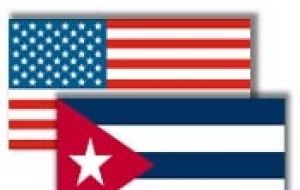MercoPress. South Atlantic News Agency
Obama administration invites Cuba to resume migration talks

The United States Department said on Friday it had offered to resume talks with Cuba about Cuban migration to the United States, a fresh sign of US President Barack Obama’s effort to comply, even partially, with the virtually unanimous request from Latinamerica to improve relations with the Castro regime.
The talks were last held in 2003 and suspended by Washington in 2004. They cover a mid-1990s agreement that aimed to prevent an exodus of Cuban refugees to the United States such as the 1980 Mariel boatlift and another wave of boat people in 1994.
“We have offered to resume the talks” State Department spokeswoman Heide Bronke said, saying the offer was made at a meeting with Cuban diplomats in Washington on Friday. Bronke said she did not know whether the Cuban government responded positively to the US overture.
Obama on April 13 decided to ease limits on family travel to Cuba and to allow US telecom companies to operate on the island, a sign that analysts said could mark the beginning of the end of the 50-year-old US embargo.
Analysts interpreted the latest move as a further token of Obama's desire to reach out to Cuba as he has to other nations such as Iran and Syria with which the United States has had strained relations for decades.
“It's a very positive initial step. It's consistent with the tone that we've seen from the Obama administration so far, as well as Cuba under Raul Castro. We've seen a new willingness to engage on both sides” said Lilia Lopez, an analyst at the Washington Office on Latin America.
Lopez said the talks were in the interests of the United States to decrease the chances of a mass exodus of Cubans like the flood of refugees who left in 1980 and then again in 1994.
The 1995 migration accord sought to put a definitive end to mass sea-borne migration. It established the repatriation to Cuba by US authorities of Cuban migrants intercepted at sea, and Havana also pledged to halt illegal migration bids.
In the same accord, the United States agreed to foster legal migration by granting at least 20,000 US visas to Cubans each year.
The administration of former US President George W. Bush suspended the talks in January 2004, saying Cuba had stymied them by refusing to discuss key issues such as giving exit permits to all Cubans who get US visas.
In the recent Summit of the Americans held in Trinidad-Tobago Latinamerican leaders called on President Obama for a normalization of relations with Cuba, which was considered essential for a better entente with the region.
Although the issue was not in the agenda, the Cuban question overshadowed the summit with a virtual understanding from both sides, through public statements, to advance towards closer relations.




Top Comments
Disclaimer & comment rulesCommenting for this story is now closed.
If you have a Facebook account, become a fan and comment on our Facebook Page!